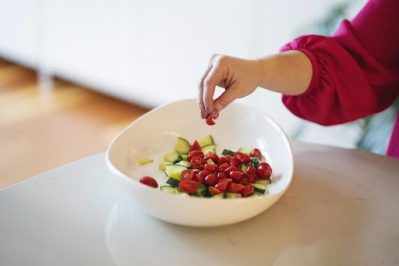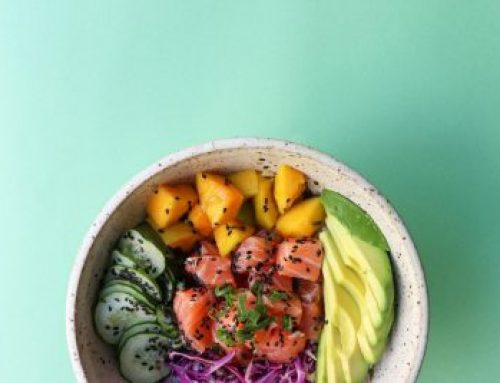Feeling overwhelmed at all the info about immunity and nutrition? Let’s dive into what the science actually says, and how to get those key nutrients.
I know you’re hearing a ton of information on what to take for immune health, it can be overwhelming! Press pause before you stock up on another supplement or health food and let’s dive into what the science says. In this week’s newsletter we’ll chat about:
- What we actually know about nutrition and immune health
- Key nutrients & how to get them
- When to use food vs supplements
A gentle reminder, information overwhelm is real and we’re all feeling it. So if you’re feeling totally burnt out by the flood of bad news and “what to do” info (including this one) it’s okay to take a break for a few days. My only tip is to focus on what you know works for you, those 2-3 key basics that help your body feel good. Immune health is an extension of over health, no diet overhaul needed.
A Quick Overview: What do we know about nutrition and immune health? Can it actually help me?
Nutrition can have a significant impact on immune health. Our immune system is a complicated network of chemical pathways that build immune cells to engulf pathogenic (“bad”) cells, produce immune chemicals that kill off bacteria or viruses, and signalling chemicals that direct the immune cells where to go and what to do by setting off the alarms when invaders appear.
Nutrients of all kinds are involved in this network.
- Proteins and key amino acids such as glutamine help to build and fortify gut cells (as well as immune cells), when of our major immune sites in the body.
- Vitamins and minerals are involved in facilitating every step of every pathway, they’re the “keys” that open the doors to chemical reactions needed to build more cells or produce a flu fighting chemical.
- Some vitamins and anti-oxidants help to “mop up” the damage caused by both the virus itself and our immune cells own effects to keep our healthy cells from being damaged and blunt the inflammatory response. These guys tend to reduce the severity of symptoms and shorten the duration of colds and flus.
- Certain fatty acids act as signalling molecules and direct those complex pathways towards their goal, or turn on the anti-inflammatory pathways when there’s too much damage happening.
Because it is a complex network of pathways, not a single outcome, we know that single nutrients aren’t very effective on their own for improving the immune response. This is especially true when we are talking about prevention, reducing the chance of actually getting a cold, flu, or bacterial pathogen. This is why most nutrients perform poorly when we test them on their own in the research, but diets rich in those nutrients seem to boost natural immunity.
What does that all mean for you? The first focus should be food.
Key Nutrients & Where to Find Them
The key nutrients found in whole foods that have been useful for improving immune response in humans are:
Fibre: found only in plant foods, having enough fibre enhanced both innate and adaptive immunity helping to balance the immune response and prevent an overactive inflammatory response.
Key sources: Dark leafy greens, whole grains (quinoa, wild rice, sprouted grain bread), starchy veggies with their skins on (yams and corn), many of the squashes (butternut, acorn etc) and seeds (hemp, chia, pumpkin, sunflower), and beans/legumes (peas, black beans, chickpeas, lentils)
Anti-oxidants & Phytonutrients: Antioxidant vitamins like Vitamin C & E, and phytonutrients like anthocyanins, glycosides and sulforaphanes have all been linked to a measurable improvement in various parts of the immune response.
Key sources: Anti-oxidants are colour coded, so having a variety of colours will cover your butt. Think red/orange (peppers, citrus, tomatoes), purple/blue (blueberries, blackberries, cherries, eggplant, red cabbage) and green (broccoli, spinach, arugula, kale, bok choy, snap peas, scallions, and more).
Selenium & Zinc: These are nutrients that, when deficient, significantly alter the immune response for the worse, increasing risk of transmission, severity and duration of cold and flu viruses. When adequate, there isn’t a lot of benefit in supplementation, so food first is key for these guys!
Key sources of Selenium: Seafood (tuna, halibut, shrimp, sardines, and more), beef and turkey are some of the richest readily available sources. If you’re plant based, you may want to add 1 Brazil Nut daily. This will cover 100% of your needs as they’re a super dense source of the nutrient.
Key sources of Zinc: Shellfish reign supreme here. Oysters, mussels, lobster (fancy!) and other shellfish are great sources, followed by your other animal proteins like beef, pork and dark meat poultry. Plant based sources are much lower but pumpkin seeds and hemp seeds do provide 20-30% at ~ 3 tbsp.
Iron: Most well known for keeping our red blood cells and oxygen levels healthy, iron also plays a key role in the immune response. That being said, excess supplemental iron can be harmful. If you tend towards low iron or anemia, or have heavy/frequent periods, continue to take your supplement while building up food sources.
Key food sources: The darker meats like beef, pork, lamb, and dark meat poultry are excellent sources and hard to beat for density (iron per serving). If you’re more plant based or pescatarian include darker beans (red lentils, black beans, kidney beans), blackstrap molasses (not the regular kind), hemp seeds, and your darkest & hardiest leafy greens (kale, bok choy, arugula, spinach (not the baby kind).
Okay, so now that we know those nutrients are important, how do I get them in without losing my mind or obsessing over tracking? I try to hit these goals but taking them into consideration when I do my weekly meal planning and choosing snacks to have regularly.
Practical goals to actually get these nutrients in daily:
- Dark leafy greens: 2-3 cups daily
- Variety in colour: 2-3 colours per day (red peppers or tomatoes, green leafies or broccoli, purple berries or eggplant).
- Cruciferous veggie daily: Broccoli, cauliflower, kale, cabbage and brussel sprouts are rich in phytonutrients that enhance immune response
- Seeds daily: 2-3 tbsp up to ¼ cup
- 20-30 g of protein at every meal
- Daily fibre booster: 1-2 Tbsp of chia, flax, psyllium or hemp seeds sprinkled on yogurt, salad or avocado toast helps get you up to the goal of 25-38 g of fibre per day.
Meal planning/snack choice tips that help me meet my needs:
- We use cauliflower (mashed, riced or roasted) at least once a week to help drive up fibre and meet the goal of a cruciferous veggie most days.
- Broccoli slaw or Cole (cabbage based) slaw are a regular staple – either cooked in recipes like this (https://therealfoodrds.com/easy-egg-roll-in-a-bowl/) or as a side to an easy protein like pulled pork.
- I sprinkle seeds on EVERYTHING. Not a lot portion wise, but I’m consistent. Pumpkin and sunflower seeds add crunch to our salad, we mix hemp seeds in if we’re breading fish or chicken, and hemp or chia goes on to our daily avocado toast.
- I disappear wiltable greens like spinach or arugula in EVERYTHING. Toss a handful under your leftovers when reheating, stir them into soups or stews, or throw a handful on top of pasta or pizza.
I chatted about supplements for immune health (including my love Vitamin D) and when to take Vitamin C and Zinc (hint, not before you have symptoms) in an Instagram live video linked here. If there’s more interest I’m happy to expand on that in written form or a follow up Q & A video, just let me know!
My biggest hope is that info like this helps you reinforce that you’re already working on the key parts of immune health, and that you don’t need to invest $100’s in fancy supplements, oils or remedies to really support your natural response. It is also to remind you that there are limits to approaching immunity naturally, if something serious is up it is completely essential to work with your medical team and follow advice – this is more important now than ever and shame on the internet hype that tries to sell you otherwise.
If you have any questions about immune health and nutrition, what I do with my own diet or supplements, or any other topic you’d like to see more of, please reply here and let me know! I’ve been getting so many more responses from you lately and it really helps to feel of service amidst all the uncertainty. Huge thank you to those of you who took the time to reach out and share your thoughts about last week’s email.
And for those of you who are feeling like they need more energy, health, and clarity on what to eat than ever with all that’s on your plate, connect with me for a 15 minute call. I’d love to support you in building that solid healthy foundation without the added stress or overwhelm of another internet rabbit hole.
Need some help getting your meals for the week balanced and prepared? If you’d like to receive our free Meal Planning Getting Started Guide AND get in on our weekly emails about all things nutrition so you can get clarity and confidence on what you’re eating, join us here!





